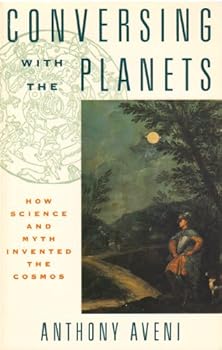Conversing With the Planets: How Science and Myth Invented the Cosmos
Select Format
Select Condition 
Book Overview
Conversing with the Planets is the first popular work of astronomical anthropology, a field pioneered by Anthony Aveni, who has taught anthropology and astronomy at Colgate University for over... This description may be from another edition of this product.
Format:Hardcover
Language:English
ISBN:0812919750
ISBN13:9780812919752
Release Date:November 1992
Publisher:Crown Publishing Group (NY)
Length:255 Pages
Weight:1.22 lbs.
Dimensions:1.0" x 6.5" x 9.5"
Customer Reviews
3 ratings
A Genius In His Own Way
Published by Thriftbooks.com User , 21 years ago
A brilliant book! Aveni draws you deep into history, researching a variety of cultures and their views on the planets and what they meant to the peoples of those ages. He does this not so much in the way of a history lesson, but with a passion for who those people were, and to show that they wern't so dumb or barbaric as they are so often labeled. Instead of doing what we modern humans do, researching just for the sake of knowledge, finding the laws that govern the universe, and thinking that our way is the only way, Aveni shows these old cultures watching the planets and using them to tie into their natural surroundings. He then goes on to show the slow changes in human conciousness as we slowly started seeing ourselves not as a part of the natural world, but something alone and seperate from our surroundings, slowly destroying our spiritual connection with the physical world. Looking at the world we live in and how we relate to it, one can see that the change hasn't been total though. We still base most of our calender systems upon ancient observations, such as our years being based upon our circling the Sun, and our months are still (losely) based on the moon doing the same with our own Earth. Even our days of the week still show the names of celestial objects. Sunday obviously is named after our very own star, while Monday is derived from the moon. Harder to see (at least for english speaking people) is Tuesday, from the Nordic word for Mars, Tiw. Wendsday comes from Woden, another name for Mercury, while Thursday is from Thor, or Jupiter. Friday or Fria, is our Venus, and finally Saturday is much easier to see as Saturn. The last chapter is more of a call to go back to our roots, at least in the sense of exploring the universe with a wonder and sense of awe that is more than just cold and scientific. Aveni seems to have a strong sense of purpose with his ideas, and this flows beautifully through the pages. To finish, if you have any inclinations towards astronomy, astrology, or archeology, then this book is a must read for you.
A literate but relatavistic defense of astrology
Published by Thriftbooks.com User , 21 years ago
In this articulate work, Aveni tries to show that the way people live has profoundly affected the way they create their understanding of the natural world, particularly the sky. Arguing that knowing the sky has always been important, he cites examples of how several ancient societies perceived the heavens, particularly in Mesoamerica and the Near East. Aveni, an expert on ancient astronomy, warns against believing that any ways other than our own of understanding and explaining nature have no value. In effect, he questions the primacy of the modern scientific method. Aveni seems to agree with those who suggest that there may be many answers, each valid in an appropriately understood framework, to the question of how nature works. Many readers may find this perspective too relativist or New Age. Dare one say politically correct? The book includes black and white illustrations.
Basic, Quick, and Fascinating
Published by Thriftbooks.com User , 22 years ago
The book is great for one who is looking to learn a little astronomy, ancient history (Mayan, Babylonian, etc.), and ancient polytheistic religion. Furthermore, the book dwells on how the ancient people's customs, religion, and astronomy all tremendously interrelated. Any high school level reader can read, understand, and enjoy the book. However, even a person, who has multiple university degrees, can find this book intriguing.






